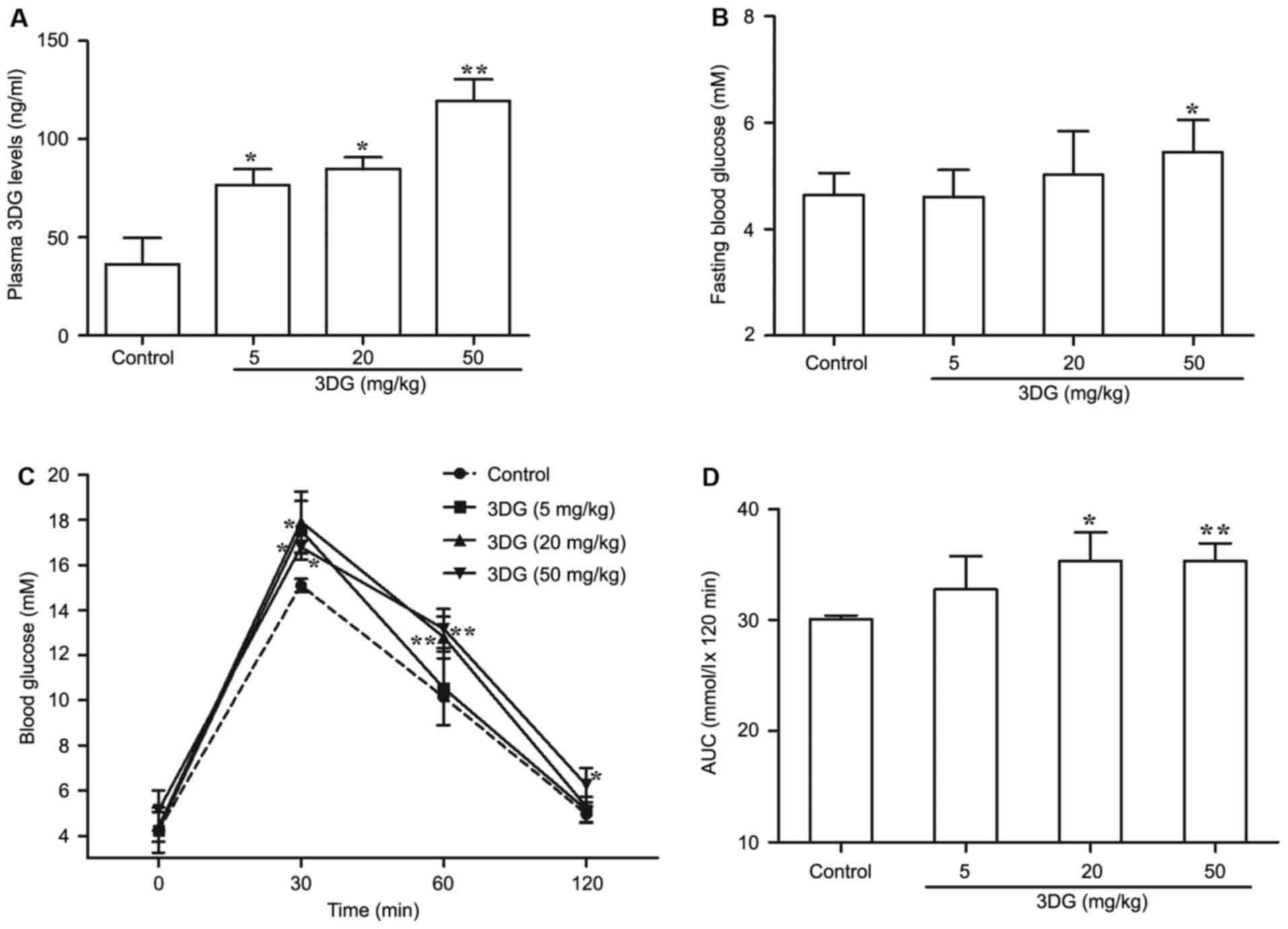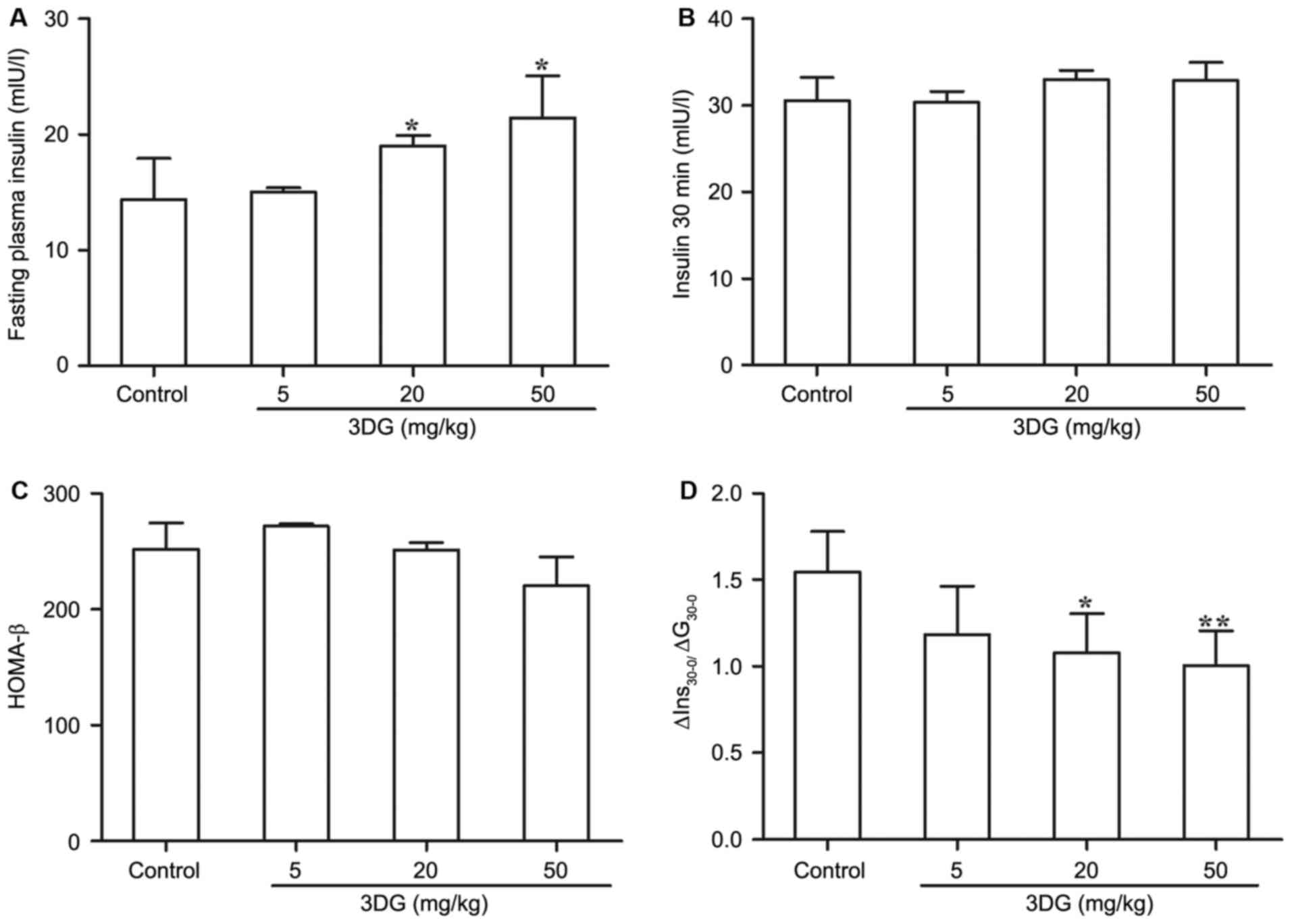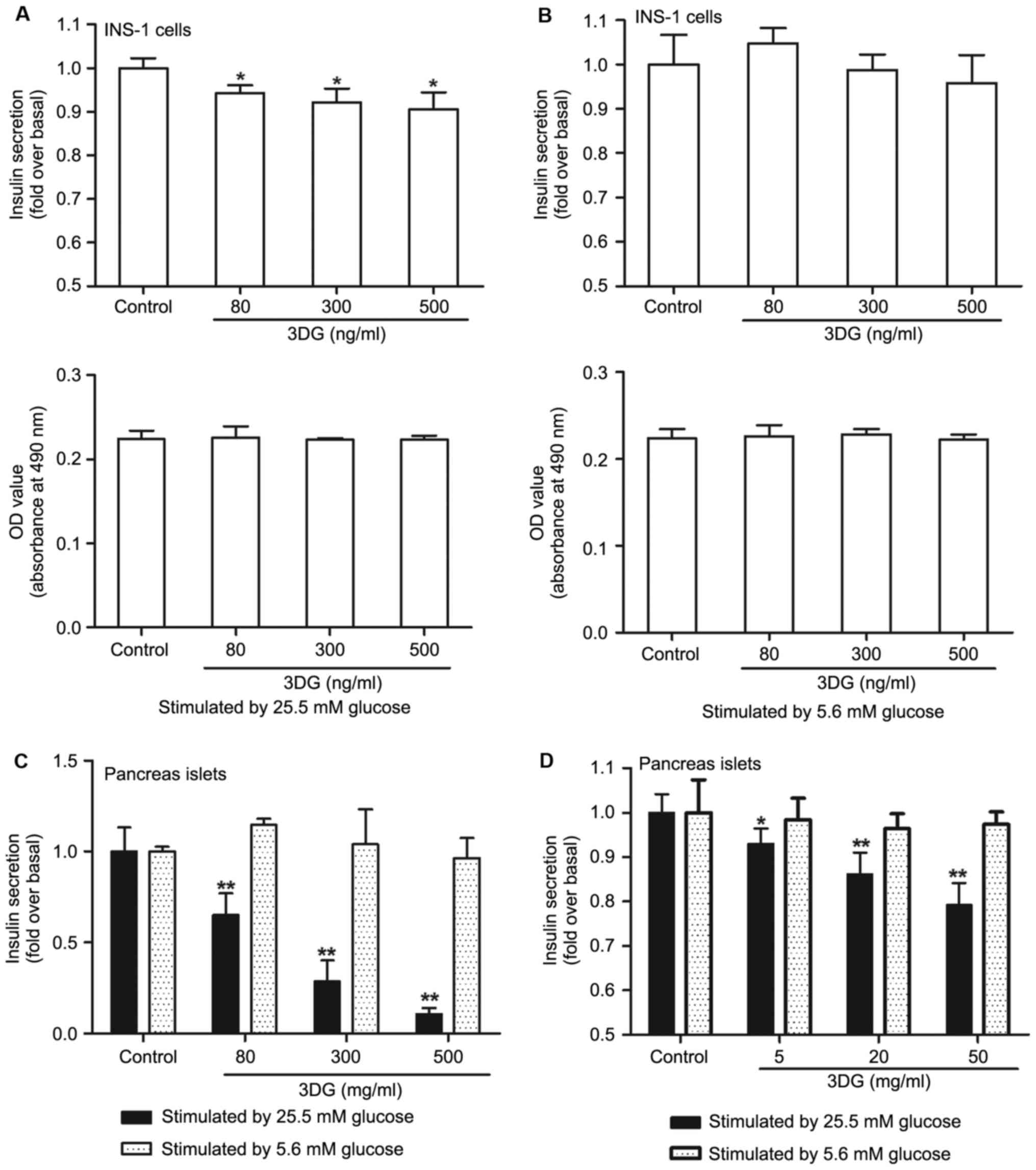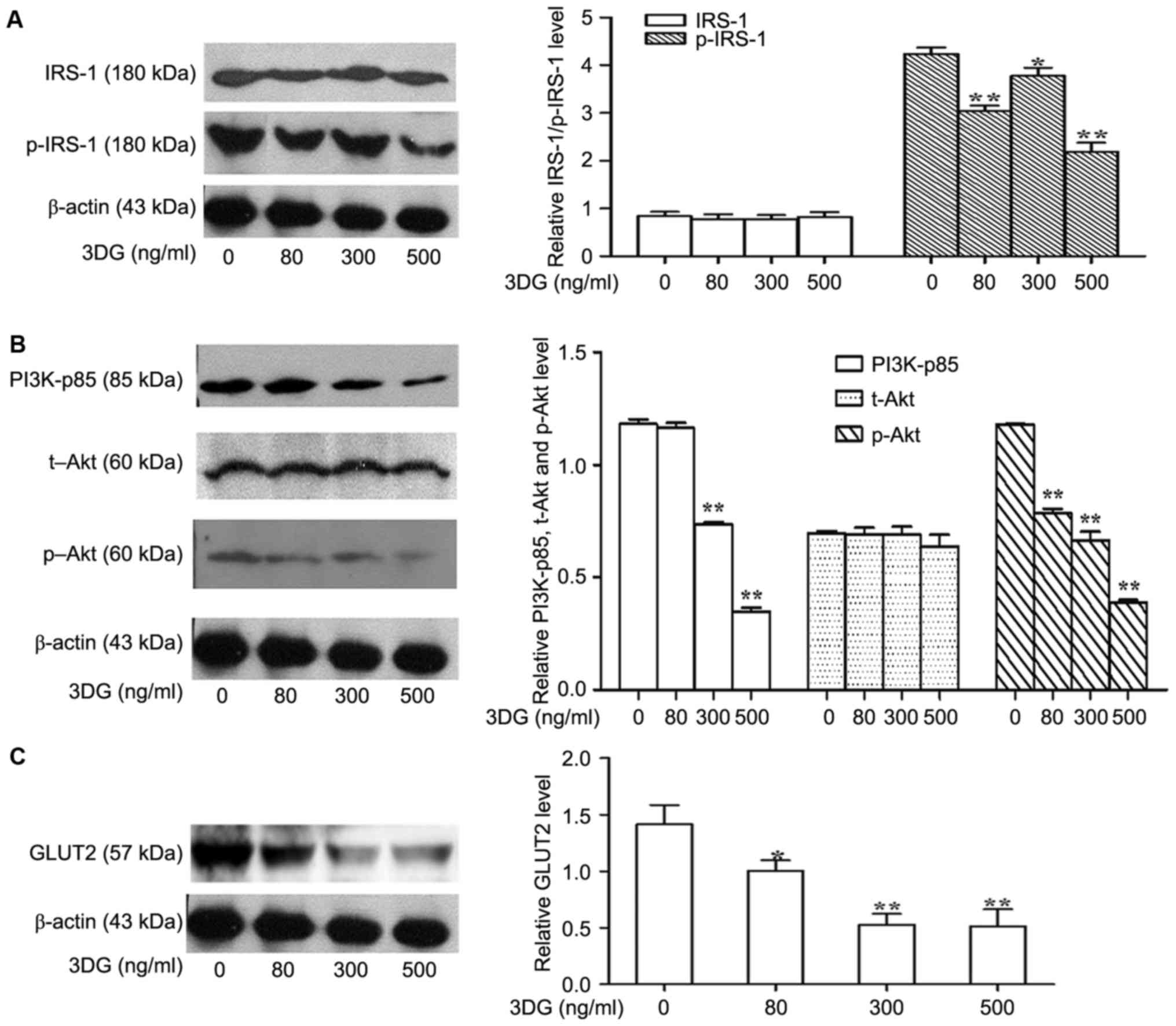|
1
|
Giuseppe D, Muhammad AG and Defronzo RA:
What are the pharmacotherapy options for treating prediabetes?
Expert Opin Pharmaco. 15:2003–2018. 2014. View Article : Google Scholar
|
|
2
|
Abdul-Ghani MA, Tripathy D and DeFronzo
RA: Contributions of beta-cell dysfunction and insulin resistance
to the pathogenesis of impaired glucose tolerance and impaired
fasting glucose. Diabetes Care. 29:1130–1139. 2006. View Article : Google Scholar : PubMed/NCBI
|
|
3
|
Rhodes CJ, White MF, Leahy JL and Kahn SE:
Direct autocrine action of insulin on β-cells: Does it make
physiological sense? Diabetes. 62:2157–2163. 2013. View Article : Google Scholar : PubMed/NCBI
|
|
4
|
Leibiger IB, Leibiger B and Berggren PO:
Insulin signaling in the pancreatic beta-cell. Annu Rev Nutr.
28:233–251. 2008. View Article : Google Scholar : PubMed/NCBI
|
|
5
|
Kulkarni RN, Brüning JC, Winnay JN, Postic
C, Magnuson MA and Kahn CR: Tissue-specific knockout of the insulin
receptor in pancreatic beta cells creates an insulin secretory
defect similar to that in type 2 diabetes. Cell. 96:329–339. 1999.
View Article : Google Scholar : PubMed/NCBI
|
|
6
|
Kulkarni RN: Receptors for insulin and
insulin-like growth factor-1 and insulin receptor substrate-1
mediate pathways that regulate islet function. Biochem Soc Trans.
30:317–322. 2002. View Article : Google Scholar : PubMed/NCBI
|
|
7
|
Kulkarni RN, Winnay JN, Daniels M, Brüning
JC, Flier SN, Hanahan D and Kahn CR: Altered function of insulin
receptor substrate-1-deficient mouse islets and cultured beta-cell
lines. J Clin Invest. 104:R69–R75. 1999. View Article : Google Scholar : PubMed/NCBI
|
|
8
|
Withers DJ, Gutierrez JS, Towery H, Burks
DJ, Ren JM, Previs S, Zhang Y, Bernal D, Pons S, Shulman GI, et al:
Disruption of IRS-2 causes type 2 diabetes in mice. Nature.
391:900–904. 1998. View
Article : Google Scholar : PubMed/NCBI
|
|
9
|
Rothenberg PL, Willison LD, Simon J and
Wolf BA: Glucose-induced insulin receptor tyrosine phosphorylation
in insulin-secreting beta-cells. Diabetes. 44:802–809. 1995.
View Article : Google Scholar : PubMed/NCBI
|
|
10
|
Aspinwall CA, Qian WJ, Roper MG, Kulkarni
RN, Kahn CR and Kennedy RT: Roles of insulin receptor substrate-1,
phosphatidylinositol 3-kinase, and release of intracellular
Ca2+ stores in insulin-stimulated insulin secretion in
beta -cells. J Biol Chem. 275:22331–22338. 2000. View Article : Google Scholar : PubMed/NCBI
|
|
11
|
da Silva Xavier G, Varadi A, Ainscow EK
and Rutter GA: Regulation of gene expression by glucose in
pancreatic beta -cells (MIN6) via insulin secretion and activation
of phosphatidylinositol 3′-kinase. J Biol Chem. 275:36269–36277.
2000. View Article : Google Scholar : PubMed/NCBI
|
|
12
|
Maessen DE, Hanssen NM, Scheijen JL, van
der Kallen CJ, van Greevenbroek MM, Stehouwer CD and Schalkwijk CG:
Post-glucose load plasma α-dicarbonyl concentrations are increased
in individuals with impaired glucose metabolism and type 2
diabetes: The CODAM study. Diabetes Care. 38:913–920. 2015.
View Article : Google Scholar : PubMed/NCBI
|
|
13
|
Dhar A, Desai KM and Wu L: Alagebrium
attenuates acute methylglyoxal-induced glucose intolerance in
Sprague-Dawley rats. Br J Pharmacol. 159:166–175. 2010. View Article : Google Scholar : PubMed/NCBI
|
|
14
|
Riboulet-Chavey A, Pierron A, Durand I,
Murdaca J, Giudicelli J and Van Obberghen E: Methylglyoxal impairs
the insulin signaling pathways independently of the formation of
intracellular reactive oxygen species. Diabetes. 55:1289–1299.
2006. View Article : Google Scholar : PubMed/NCBI
|
|
15
|
Jia X and Wu L: Accumulation of endogenous
methylglyoxal impaired insulin signaling in adipose tissue of
fructose-fed rats. Mol Cell Biochem. 306:133–139. 2007. View Article : Google Scholar : PubMed/NCBI
|
|
16
|
Fiory F, Lombardi A, Miele C, Giudicelli
J, Beguinot F and Van Obberghen E: Methylglyoxal impairs insulin
signalling and insulin action on glucose-induced insulin secretion
in the pancreatic beta cell line INS-1E. Diabetologia.
54:2941–2952. 2011. View Article : Google Scholar : PubMed/NCBI
|
|
17
|
Eriksson UJ, Wentzel P, Minhas HS and
Thornalley PJ: Teratogenicity of 3-deoxyglucosone and diabetic
embryopathy. Diabetes. 47:1960–1966. 1998. View Article : Google Scholar : PubMed/NCBI
|
|
18
|
Degen J, Hellwig M and Henle T:
1,2-dicarbonyl compounds in commonly consumed foods. J Agric Food
Chem. 60:7071–7079. 2012. View Article : Google Scholar : PubMed/NCBI
|
|
19
|
Okado A, Kawasaki Y, Hasuike Y, Takahashi
M, Teshima T, Fujii J and Taniguchi N: Induction of apoptotic cell
death by methylglyoxal and 3-deoxyglucosone in macrophage-derived
cell lines. Biochem Biophys Res Commun. 225:219–224. 1996.
View Article : Google Scholar : PubMed/NCBI
|
|
20
|
Che W, Asahi M, Takahashi M, Kaneto H,
Okado A, Higashiyama S and Taniguchi N: Selective induction of
heparin-binding epidermal growth factor-like growth factor by
methylglyoxal and 3-deoxyglucosone in rat aortic smooth muscle
cells. The involvement of reactive oxygen species formation and a
possible implication for atherogenesis in diabetes. J Biol Chem.
272:18453–18459. 1997. View Article : Google Scholar : PubMed/NCBI
|
|
21
|
Kalapos MP: Methylglyoxal in living
organisms: Chemistry, biochemistry, toxicology and biological
implications. Toxicol Lett. 110:145–175. 1999. View Article : Google Scholar : PubMed/NCBI
|
|
22
|
Niwa T: 3-Deoxyglucosone: Metabolism,
analysis, biological activity, and clinical implication. J
Chromatogr B Biomed Sci Appl. 731:23–36. 1999. View Article : Google Scholar : PubMed/NCBI
|
|
23
|
Sassi-Gaha S, Loughlin DT, Kappler F,
Schwartz ML, Su B, Tobia AM and Artlett CM: Two dicarbonyl
compounds, 3-deoxyglucosone and methylglyoxal, differentially
modulate dermal fibroblasts. Matrix Biol. 29:127–134. 2010.
View Article : Google Scholar : PubMed/NCBI
|
|
24
|
Wang Q, Jiang GR and Zhang LR: Effects of
3-deoxyglucosone on blood glucose of normal mice. Chinese J
Diabetes. 18:220–222. 2010.
|
|
25
|
Lal S, Kappler F, Walker M, Orchard TJ,
Beisswenger PJ, Szwergold BS and Brown TR: Quantitation of
3-deoxyglucosone levels in human plasma. Arch Biochem Biophys.
342:254–260. 1997. View Article : Google Scholar : PubMed/NCBI
|
|
26
|
Hamada Y, Nakamura J, Fujisawa H, Yago H,
Nakashima E, Koh N and Hotta N: Effects of glycemic control on
plasma 3-deoxyglucosone levels in NIDDM patients. Diabetes Care.
20:1466–1469. 1997. View Article : Google Scholar : PubMed/NCBI
|
|
27
|
Beisswenger PJ, Howell SK, O'Dell RM, Wood
ME, Touchette AD and Szwergold BS: alpha-Dicarbonyls increase in
the postprandial period and reflect the degree of hyperglycemia.
Diabetes Care. 24:726–732. 2001. View Article : Google Scholar : PubMed/NCBI
|
|
28
|
Jiang G, Zhang L, Ji Q, Wang F, Xu H,
Huang F and Wang C: Accumulation of plasma 3-deoxyglucosone
impaired glucose regulation in Chinese seniors: Implication for
senile diabetes? Diabetes Metab Syndr. 6:140–145. 2012. View Article : Google Scholar : PubMed/NCBI
|
|
29
|
Liang G, Song X, Xu H, Wang F, Zhang L,
Zhou L and Jiang G: 3-Deoxyglucosone induced acute glucose
intolerance in sprague-dawley rats: Involvement of insulin
resistance and impaired β-cell function. Exp Clin Endocrinol
Diabetes. 124:431–436. 2016. View Article : Google Scholar : PubMed/NCBI
|
|
30
|
Liang G, Wang F, Song X, Zhang L, Qian Z
and Jiang G: 3-Deoxyglucosone induces insulin resistance by
impairing insulin signaling in HepG2 cells. Mol Med Rep.
13:4506–4512. 2016.PubMed/NCBI
|
|
31
|
Kahn SE, Cooper ME and Del Prato S:
Pathophysiology and treatment of type 2 diabetes: Perspectives on
the past, present, and future. Lancet. 383:1068–1083. 2014.
View Article : Google Scholar : PubMed/NCBI
|
|
32
|
Schwartz MW, Seeley RJ, Tschöp MH, Woods
SC, Morton GJ, Myers MG and D'Alessio D: Cooperation between brain
and islet in glucose homeostasis and diabetes. Nature. 503:59–66.
2013. View Article : Google Scholar : PubMed/NCBI
|
|
33
|
Kato H, van Chuyen N, Shinoda T, Sekiya F
and Hayase F: Metabolism of 3-deoxyglucosone, an intermediate
compound in the Maillard reaction, administered orally or
intravenously to rats. Biochim Biophys Acta. 1035:71–76. 1990.
View Article : Google Scholar : PubMed/NCBI
|
|
34
|
Tabák AG, Herder C, Rathmann W, Brunner EJ
and Kivimäki M: Prediabetes: A high-risk state for diabetes
development. Lancet. 379:2279–2290. 2012. View Article : Google Scholar : PubMed/NCBI
|
|
35
|
Hu FB, Van Dam RM and Liu S: Diet and risk
of type II diabetes: The role of types of fat and carbohydrate.
Diabetologia. 44:805–817. 2001. View Article : Google Scholar : PubMed/NCBI
|
|
36
|
Tabák AG, Jokela M, Akbaraly TN, Brunner
EJ, Kivimäki M and Witte DR: Trajectories of glycaemia, insulin
sensitivity, and insulin secretion before diagnosis of type 2
diabetes: An analysis from the Whitehall II study. Lancet.
373:2215–2221. 2009. View Article : Google Scholar : PubMed/NCBI
|
|
37
|
Gastaldelli A, Ferrannini E, Miyazaki Y,
Matsuda M, DeFronzo RA, et al: San Antonio metabolism study:
Beta-cell dysfunction and glucose intolerance: Results from the San
Antonio metabolism (SAM) study. Diabetologia. 47:31–39. 2004.
View Article : Google Scholar : PubMed/NCBI
|
|
38
|
Stancáková A, Javorský M, Kuulasmaa T,
Haffner SM, Kuusisto J and Laakso M: Changes in insulin sensitivity
and insulin release in relation to glycemia and glucose tolerance
in 6,414 Finnish men. Diabetes. 58:1212–1221. 2009. View Article : Google Scholar : PubMed/NCBI
|
|
39
|
Thorens B, Sarkar HK, Kaback HR and Lodish
HF: Cloning and functional expression in bacteria of a novel
glucose transporter present in liver, intestine, kidney, and
beta-pancreatic islet cells. Cell. 55:281–290. 1988. View Article : Google Scholar : PubMed/NCBI
|
|
40
|
Unger RH: Diabetic hyperglycemia: Link to
impaired glucose transport in pancreatic beta cells. Science.
251:1200–1205. 1991. View Article : Google Scholar : PubMed/NCBI
|
|
41
|
Guillam MT, Hümmler E, Schaerer E, Yeh JI,
Birnbaum MJ, Beermann F, Schmidt A, Dériaz N and Thorens B: Early
diabetes and abnormal postnatal pancreatic islet development in
mice lacking Glut-2. Nat Genet. 17:327–330. 1997. View Article : Google Scholar : PubMed/NCBI
|
|
42
|
Assmann A, Ueki K, Winnay JN, Kadowaki T
and Kulkarni RN: Glucose effects on beta-cell growth and survival
require activation of insulin receptors and insulin receptor
substrate 2. Mol Cell Biol. 29:3219–3228. 2009. View Article : Google Scholar : PubMed/NCBI
|
|
43
|
Kaneto H, Matsuoka TA, Miyatsuka T,
Kawamori D, Katakami N, Yamasaki Y and Matsuhisa M: PDX-1 functions
as a master factor in the pancreas. Front Biosci. 13:6406–6420.
2008. View Article : Google Scholar : PubMed/NCBI
|
|
44
|
Brissova M, Shiota M, Nicholson WE, Gannon
M, Knobel SM, Piston DW, Wright CV and Powers AC: Reduction in
pancreatic transcription factor PDX-1 impairs glucose-stimulated
insulin secretion. J Biol Chem. 13:11225–11232. 2002. View Article : Google Scholar
|
|
45
|
Sakiyama H, Takahashi M, Yamamoto T,
Teshima T, Lee SH, Miyamoto Y, Misonou Y and Taniguchi N: The
internalization and metabolism of 3-deoxyglucosone in human
umbilical vein endothelial cells. J Biochem. 139:245–253. 2006.
View Article : Google Scholar : PubMed/NCBI
|


















